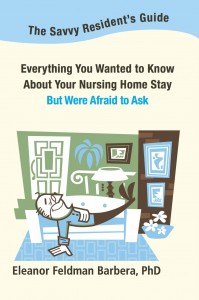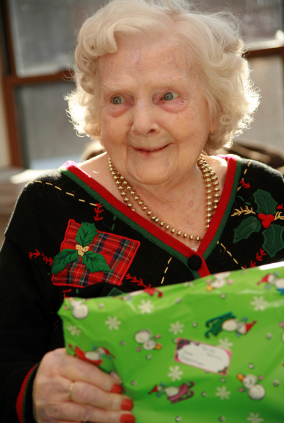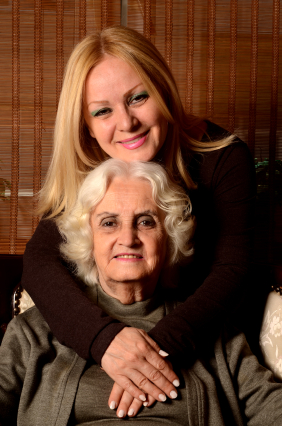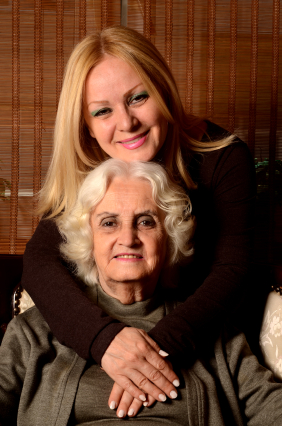Category: For Families
Posted by Dr. El - November 20, 2015 - Communication, Engaging with families, For Families, Tips for gifts, visits, Videos

With the start of the holiday season, it’s time for this perennial post from Dr. El:

‘Twas the Week Before Christmas…
And 83-year old Albertha assured me her family was planning to take her home for the holidays.
“Have you talked to them about it? Have they called the social worker to arrange a pass, and meds, and transportation?”
“No,” she replied, “but they’re coming to get me.”
‘Twas the week after Christmas, and Albertha was glum.
“They didn’t show up. I waited all day, but they didn’t come.”
Albertha spent Christmas day watching other people go out on pass and return, and seeing families arriving with food and gifts and smiles.
Now my residents and I start discussing the holidays a few weeks in advance, addressing wishes and practicalities, phoning families if needed, and getting the social worker involved. We set up a hierarchy of plans.
Plan A: Go home for the day.
Plan B: Go out to a wheelchair accessible restaurant with family.
Plan C: Have visitors come with food and go around the corner for coffee, if possible, just to get out.
Plan D: Stay in with visitors and food.
Plan E: Talk to family members on the telephone, discussing plans for a future visit, while sitting in a room festooned with cards and holiday decorations. Attend the nursing home holiday party.
Plan F: Have a small holiday gathering in the room with nursing home friends after the facility party.
Since then, my people know what to expect from the holidays, even if the expectation is that their family might not arrive as hoped.
Three tips from Dr. El for the holidays (click here or view below): http://youtu.be/8HTjVoKQmKo

MyBetterNursingHome.com
Posted by Dr. El - December 17, 2014 - Customer service, Engaging with families, For Families, Tips for gifts, visits

This post, along with my Planning for the Holidays article, could be printed out and left for family members in a prominent location. Think of it as your gift to every nursing home family.
~Happy Holidays from Dr. El at MyBetterNursingHome.com

With the holiday season upon us, you may be wondering what would make a good present for a relative in a nursing home. In my efforts to banish the barren nursing home room, photos are still my number one pick for holiday gifts, but here are other suggestions (be sure to label everything!):
Nice lotions, soaps, and grooming products
A special bedspread
A “lap” blanket to wear while sitting in a wheelchair
Wheelchair accessories (Google it) like cup holders, side pockets, wheel lights, etc.
Sturdy clothes that can handle being washed in an industrial washing machine
Colorful bangle bracelets to blend in with nursing home wrist bands
My book, The Savvy Resident’s Guide: Everything You Wanted to Know About Your Nursing Home Stay But Were Afraid to Ask
Plants, or potted flowers, especially if you can come by to water them regularly
Great gifts from the heart:
Make a commitment to visit once a week, or once a month
Make a commitment to call once a week, or once a day
Organize friends and family so that each person has a week to call or visit
Bring a home-cooked meal
Organize friends and family to bring a home-cooked meal on a regular basis
Posted by Dr. El - December 3, 2014 - CareConversations.org, For Families, Transitions in care

My second post at Care Conversations.org focuses on easing the transition to long-term care for families.
As a psychologist, I’ve talked with hundreds of residents as they transition to living in a Skilled Nursing Care center. In the privacy of a psychotherapy session, new residents will frequently share with me things they haven’t mentioned to their families, often because they don’t quite know what to say or how to say it.
Their perspectives may surprise you:
- They’re worried about you. They’re concerned about how much time you’re spending at the facility. They worry you’re neglecting yourself and your life. They want you to take care of yourself because they love you and because they need you – so take their advice and do so!
- They know you’ve done your best. In most cases, new residents are aware they would have been admitted to a long-term care facility much sooner if it hadn’t been for you. While they may not be happy about the transition initially, they know that without you they would have been here long ago.
For the entire article, visit:

Posted by Dr. El - December 1, 2014 - CareConversations.org, For Families, Transitions in care

I’m excited to let you know about my recent post for family members at Care Conversations.org. Readers who are long-term care staff members will find it a helpful resource to share with family members.
Moving to an assisted living or a skilled nursing facility can be challenging for both you and your loved one. To help make the transition less stressful, it’s often suggested that family members work with staff to ensure their loved one’s needs are being met. Here are some ways to become a valuable player on the nursing home team:
- Keep an open mind – It is normal to feel nervous about placing a loved one in a long-term care facility. But as our loved ones grow older and begin experiencing more and more health issues, their needs are often best met by skilled nursing facilities. Entering a facility with an expectation of good care puts you in a teamwork frame of mind.
- Recognize the expertise of LTC workers – Nobody knows Mom, Dad or Aunt Sue like you do, but chances are that you haven’t handled a situation quite like this before. By contrast, those who work with elders have observed hundreds of similar situations and bring a vast amount of knowledge and experience to the care of your loved one. It’s good to have them with you on this journey.
- Appreciate your essential role on the team —
For the entire article, visit:

Posted by Dr. El - November 21, 2014 - Communication, Engaging with families, For Families, Tips for gifts, visits, Videos

With the start of the holiday season, it’s time for this perennial post from Dr. El at mybetternursinghome.com:

‘Twas the Week Before Christmas…
And 83-year old Albertha assured me her family was planning to take her home for the holidays.
“Have you talked to them about it? Have they called the social worker to arrange a pass, and meds, and transportation?”
“No,” she replied, “but they’re coming to get me.”
‘Twas the week after Christmas, and Albertha was glum.
“They didn’t show up. I waited all day, but they didn’t come.”
Albertha spent Christmas day watching other people go out on pass and return, and seeing families arriving with food and gifts and smiles.
Now my patients and I start discussing the holidays a few weeks in advance, addressing wishes and practicalities, phoning families if needed, and getting the social worker involved. We set up a hierarchy of plans.
Plan A: Go home for the day.
Plan B: Go out to a wheelchair accessible restaurant with family.
Plan C: Have visitors come with food and go around the corner for coffee, if possible, just to get out.
Plan D: Stay in with visitors and food.
Plan E: Talk to family members on the telephone, discussing plans for a future visit, while sitting in a room festooned with cards and holiday decorations. Attend the nursing home holiday party.
Plan F: Have a small holiday gathering in the room with nursing home friends after the facility party.
Since then, my people know what to expect from the holidays, even if the expectation is that their family might not arrive as hoped.
Three tips from Dr. El for the holidays (click here or view below): http://youtu.be/8HTjVoKQmKo
Posted by Dr. El - February 14, 2014 - For Families, Tips for gifts, visits, Videos

In this video, Dr. El offers a suggestion for families who are new to long-term care:
Posted by Dr. El - November 25, 2013 - For Families, Tips for gifts, visits, Videos

Posted by Dr. El - October 31, 2013 - For Families, Talks/Radio shows


I’m giving a free local talk at 1pm on Wednesday, November 13, 2013 at the Baldwin Public Library on long-term care decision-making and making the most of nursing home stays.
I’ll hope you’ll be able to join me for this hour-long talk and discussion session at my hometown library. (It’s where I checked out literally piles of books when I was a kid.)
Baldwin Public Library
2385 Grand Avenue
Baldwin, NY 11510
(516) 223-6228
Wednesday, November 13th, 2013
1pm – 2pm
Posted by Dr. El - October 7, 2013 - Communication, Dementia, For Families

This article for families visiting relatives with dementia in long-term care appears as a guest post on Deborah Shouse Writes where Deborah Shouse, author of Love in the Land of Dementia, offers advice and support for families along their caregiving journey.

It wasn’t just an ordinary visit. I walked into the long-term care facility and made my way to the memory care unit. I paused in front of the locked door, pulled a crumpled scrap of paper out of my pocket and tapped the entry code into the keypad. As I walked to my mother’s room, her new home, I felt sad, confused and guilty. How was I going to connect with my mom in this strange new environment?
Eleanor Feldman Barbera, PhD, author of The Savvy Resident’s Guide, has 16 years of experience as a psychologist in long-term care and understands the emotions and confusions family or friends might feel when visiting in a long-term care facility. Here are her tips for having a meaningful connection.
Seven Tips for Visiting a Loved One in a Long-Term Care Facility
Many families find it stressful to visit their loved ones in long-term care, especially if dementia has changed their usual ways of relating. Here are seven ways to make the most of your visits:
- Help the room feel like home by bringing photos and bedspreads, creating an environment that feels more comfortable and familiar to your relative and more pleasant for you to visit. Labeling the photos with names (such as “Oldest son, Sam”) provides reminders in your absence and clues for the staff that are with your loved one daily.
-
Turn off the television or radio and close the door during your time together. When the room is quiet and free of distractions, it’s easier for someone with dementia (and for those with hearing loss) to focus on their visitors.
For the entire article, visit:
Posted by Dr. El - September 24, 2013 - For Families, Senior Care

Here’s my latest article featured in SeniorCare:

Why (and How) to Personalize a Nursing Home Room
As a psychologist in long-term care, I’ve walked into thousands of rooms over the years. Among many mostly bare quarters, a few stood out for their warmth and their ability to convey the life of the person living there.
Why is it so important to decorate the room of your loved one when they aren’t able to do it themselves?
For the Resident
Even if their stay is expected to be a brief one, it’s important for their room to have a personal touch. Moving from home to hospital to rehab can be disconcerting for most people and disorienting for many, especially those with dementia.
Having a personal item or two can be reassuring and can act as what mental health professionals call a “transitional object.” A transitional object for a young child might be a teddy bear that accompanies them to a sleepover; a transitional object for an adult could be a treasured photo of their parents or their wedding day.
Aside from providing a touchstone during a difficult time, room decor can be a powerful reminder of who your loved one has been in their life before they became “a patient.” Staff may refer to Mrs. Rivera as “the lady in 214,” but when she enters a Room 214 filled with reminders of her life and accomplishments she can feel comfortable and proud.
A resident with a few photos on the side table has constant reminders that there are people who care how they’re doing—their personal cheerleading squad. For residents with dementia, it’s helpful to write the names of the family members and their connection. Mrs. Cook, for instance, can look at the photo and be reminded that she is seeing her youngest son Tom and not a familiar face she realizes she should know but doesn’t.
For the staff
A personalized room reminds staff that someone is checking on Mrs. Cook. It also helps them give Mrs. Cook the care she needs. For example, if staff members see a photo of her in her flower garden, they’ll be able to make a personal connection, perhaps sharing a discussion of gardening while engaging in previously challenging personal care. If they know Mr. Smith used to work nights, they’ll be more able to understand and perhaps accommodate his unusual schedule.
How to decorate
There are many ways you can personalize a room, but if you can do only one thing, bring or mail in labeled photos of the family. Use copies, not originals. Other important items include a picture of the resident as a young person, photos of them engaging in valued activities (such as heading to work, on a special trip, or with grandchildren), and copies of awards or diplomas reflecting their contribution to the world. Asking your loved one if there’s something they’d like from home can identify what’s most important to them and increase their sense of control. As wonderful as fresh flowers are, if you’re not there in three days to remove them or to regularly water a plant, consider long-lasting artificial flowers to cheer a windowsill. A (labeled) quilt not only transforms the look of a room from institutional to homey, but allows your loved one to feel literally covered with affection.


















